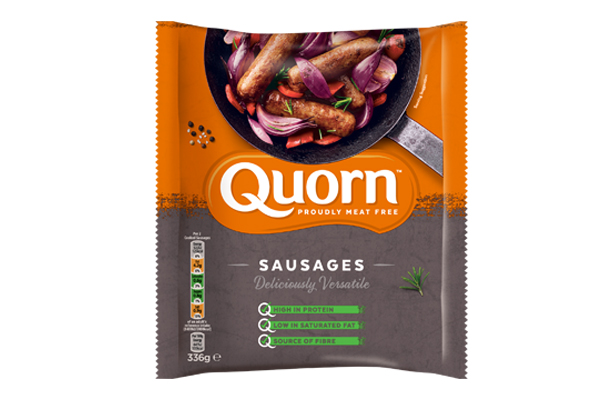In the past few years, there has been a global shift away from meat, with 70% of the world population reportedly either reducing meat consumption or leaving meat off the table altogether. Katie Woodward takes a closer look at the alternative meat market
According to recent research from GlobalData, the overwhelming majority of the world’s population has adopted a diet in recent years that features either reduced or entirely absent meat consumption. Changing consumer habits and the rise of ‘flexitarianism’ – eating predominantly, but not strictly, vegetarian – has led to the reduced consumption of meat in favour of vegetables and meat alternatives.
Flexitarianism was a key trend in 2017 and one that is expected to continue, having emerged as a much more achievable alternative to going full vegetarian or vegan. The market for meat alternatives is set to capitalise on this trend. In the UK, for example, sales of meat substitutes are predicted to grow by 25%, compared to just 8.1% growth for chicken, pork and beef, according to Informa’s Agribusiness Intelligence. We examine this new trend and take a closer look at the alternative meat market.
Key drivers: Millennials push meat alternatives market
The worldwide shift away from meat consumption is largely being driven by the millennial generation, according to Fiona Dyer, consumer analyst at GlobalData. “The shift towards plant-based food is being driven by millennials, who are most likely to consider the food source, animal welfare issues, and environmental impacts when making their purchasing decisions.”
UK sales of meat substitutes are predicted to increase by 25% in five years, from £180m in 2016 to £225m in 2021, as diets and lifestyle choices such as vegetarianism, veganism and flexitarianism continue to grow in popularity. However, real meat does have an enduring appeal, and persuading consumers to opt for plant-based alternatives often means finding ways to help them swap without feeling deprived of meat.
This desire for alternative meat products that reflect the real deal as closely as possible explains the success behind well-established meat substitutes, including textured vegetable protein, a fibrous product primarily made from soy, and the popular quorn, a mycoprotein derived from fungus.
Mycoprotein is high in protein, high in fibre, low in saturated fat and contains no cholesterol; and because its production requires less land and water than producing animal proteins, mycoprotein is popular among environmentally conscious consumers, as it has a 90% lower carbon footprint.
Environmental concerns: The rise of sustainable living
As the ranks of vegetarians and vegans continue to swell as more consumers turn away from meat, for many this decision is down to animal welfare and environmental concerns.
Many studies have shown the detrimental impact that meat consumption has on the environment, and it’s hard to ignore the fact that some organisations have estimated that the livestock sector could be responsible for as much as 51% of global greenhouse gas emissions. The huge volume of grain and water needed to raise livestock is also a concern for experts and consumers worried about feeding an additional 2 billion people by 2050.
These concerns have encouraged the rise of ethical and sustainable living, especially among millennials, who have been instrumental in supporting meat-free movements such as the Meat-Free Monday campaign, which was started by Paul and Stella McCartney in 2009.
However, in order to get the recommended amount of protein as part of a healthy diet while leading an environmentally responsible lifestyle, consumers are looking for alterative protein sources, such as quorn, tofu and lentils. Meat-free companies are reaping the benefits from the rise in sustainable living and flexitarianism. In 2017, for example, the growth of partially meat-free diets was attributed as the main reason for sales growth at UK-based Quorn Foods. The company reported a 19% rise in sales in the first half of the year, which they put down to a long-term move towards a healthier and more sustainable relationship with food, fuelled in large part by the millennial generation.

Plant Meat Matters: Scaling up the processing technology
In 2017, a four-year initiative called Plant Meat Matters began in the Netherlands, paving the way for a new generation of meat substitute products. The project is the first global initiative to study the appearance, texture, taste and sustainability benefits of vegetable alternatives to meat, and will make industrial-scale, mild production processes possible.
The consortium, which includes partners Unilever, Givaudan and Ingredion, is using innovative shear-cell technology developed by researchers from Wageningen University in the Netherlands to transform vegetable protein into a layered, fibrous structure that closely matches the appearance and texture of real meat. The raw materials are mildly processed until the desired structure is achieved.
“Shear-cell technology is a relatively simply, mild and energy-efficient technology that makes the production of meat substitute products accessible to a broad user group,” says Niko Koffeman, marketing and communications manager at Dutch food manufacturer The Vegetarian Butcher, which partnered with the university researchers in 2015. “It is not only applicable to food manufacturers, but also the chefs and, in the future, to the consumer in their kitchen.”
The processing methods, which are mild and have a smaller carbon footprint than conventional methods such as extrusion, have until now only been available at lab and pilot scales. The Plant Meat Matters project is the first to scale it up, with first products expected to hit the shelves in 2019. “In four years, we will have a first version of a production line that will allow companies to make excellent meat substitutes in large volumes, with a variety of textures. Imagine, for example, a 100% vegetable steak,” says Atze Jan van der Goot, professor at Wageningen University.
“Our work will boost further growth of the market for meat substitutes, which currently constitute only 1% of the meat market,” he added. The development of meat-identical plant products could cause a food revolution, which is essential as current methods cannot meet the enormous demand for animal meat.
Share